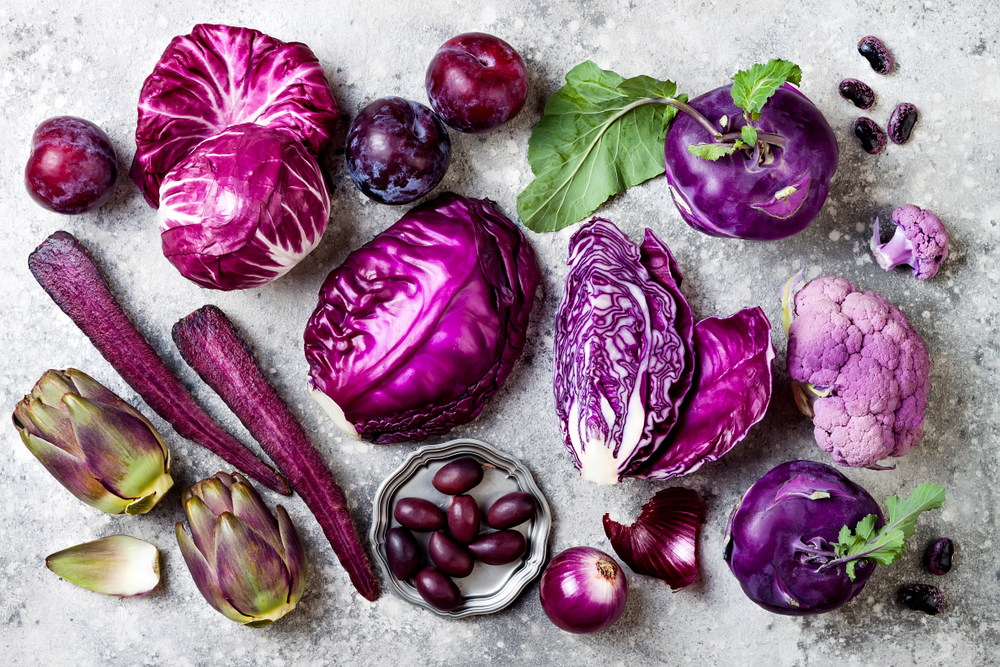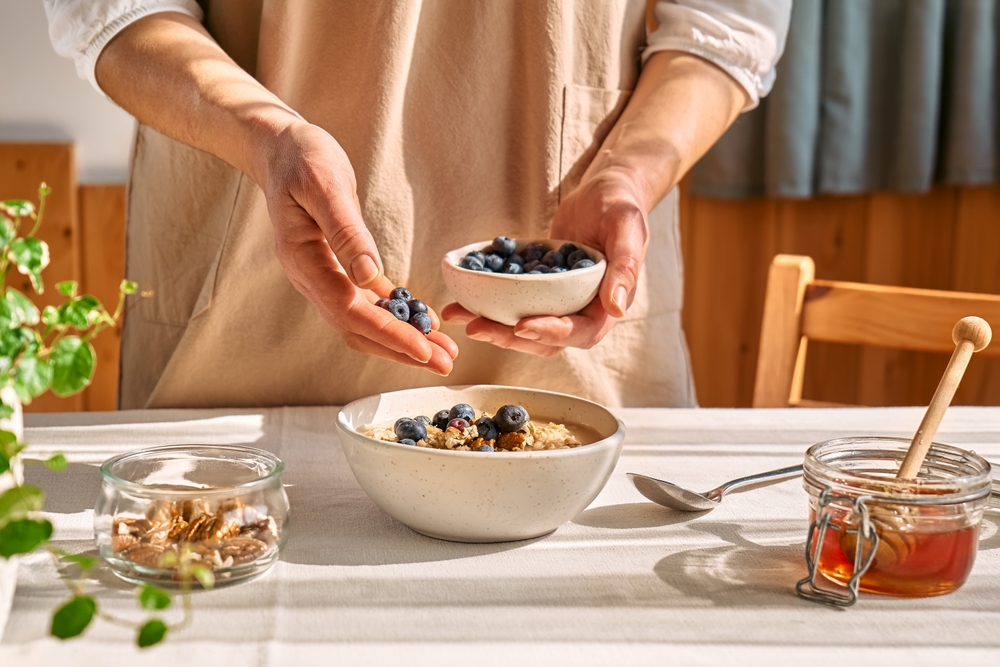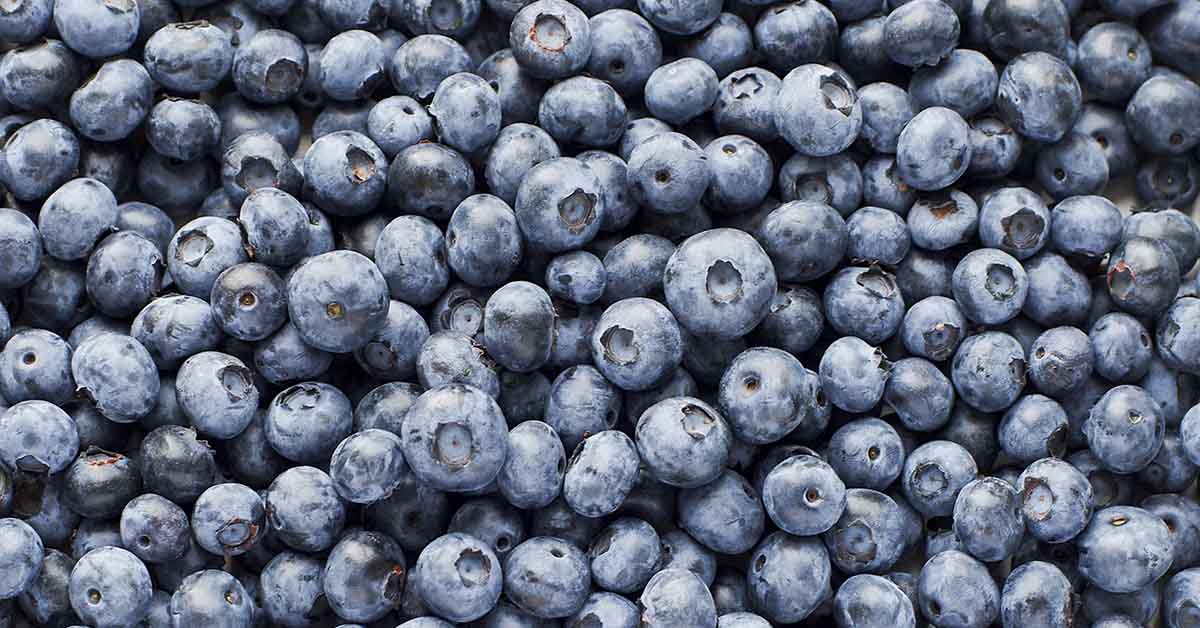Blueberries have for a long time now been touted as a “superfood”, meaning that they are packed with powerful, disease-fighting nutrients. There is no doubt that this small fruit is seriously good for you – but what would happen if you ate blueberries every single day? Here are six things you can expect to happen to your health if you make eating blueberries a daily habit.
The Benefits of Blueberries

The benefits of blueberries are almost too many to count. They are low in calories, low in sugar, high in hydrating water, and packed with nutrients and antioxidants we need to support our health. Registered dietitian Jordan Hill says that there are numerous positives affects that blueberries can have on your health.
“Those effects include heart, brain, digestive, eye and skin benefits,” she explains. “The antioxidants and phytochemicals in blueberries may help to support hormonal balance, heart health, and skin health, while the folate and vitamin C can contribute to fertility and prenatal health,”
They are also, conveniently, delicious. Blueberries add a tasty pop of color to any dish, whether it’s your morning bowl of oats, a spinach salad, or a bowl of yogurt as an evening snack. If you eat blueberries every day, your health will benefit. This is what you can expect to see.
Read More: 10 Benefits of Elderberry (Immune System, Heart Health, and More)
1. Reduce Your Risk of Chronic Diseases

Blueberries are like little disease-fighting machines. They are rich in anthocyanins, which are powerful antioxidants that have anti-inflammatory effects in the body. Studies suggest that these compounds may reduce the risk of chronic illnesses such as diabetes and cardiovascular disease. Regular blueberry consumption may also help to lower inflammatory markers in your body, contributing to overall disease prevention. Of course, you can’t expect complete magic. Eating blueberries each day won’t make up for an otherwise poor diet and sedentary lifestyle. They are an incredible fruit, but they can’t work alone.
2. Boost Your Fiber Intake

Fiber is an essential nutrient for your gut health, cholesterol management, and blood sugar stability. Just one cup of blueberries provides a significant portion of your daily fiber needs. This means that blueberries are an excellent choice for supporting your digestive system, blood sugar management, and long-term health goals.
Read More: 6 Things That Could Happen When You Stop Eating Sugar
3. Benefit Your Heart Health

The anthocyanins found in high concentrations in blueberries have been linked to a reduced risk of cardiovascular disease. Research shows that those with a higher intake of anthocyanins may have lower risk of heart-related issues such as heart attacks and high blood pressure. Including blueberries in your daily diet may help to enhance vascular function and support the health of your heart.
4. Support Your Cognitive Health

For generations people have said that cognitive decline is just a natural part of aging. Today, however, we know that this is not necessarily true – a healthy lifestyle can keep your cognitive function optimal long into old age. Studies show that consumption of blueberries can improve cognitive performance in both older and younger adults. Regular consumption of blueberries has been associated with enhanced memory and cognitive function. This emphasizes the fruit’s potential benefits for brain health.
5. Improve Your Immune Health

Vitamin C has been the number one vitamin for immune system support since we learned what vitamin C and the immune system even were. Blueberries contain a significant amount of vitamin C, but the vitamin C in this fruit doesn’t work alone. The combined effects of the vitamin C and anthocyanins found in blueberries helps to support the immune system by reducing oxidative stress. Eating blueberries daily can help to strengthen your body’s defenses against a whole range of illnesses.
Read More: The Benefits of Eating Eggs (Even Everyday)
6. Might Benefit Your Gut Health

Maintaining a healthy gut microbiome is essential for your overall health and well-being. Research suggests that blueberries may have a positive impact on our gut health, again, a likely combination of fiber and the specific nutrient profile of the fruit. Preliminary studies have shown that blueberry consumption could improve the diversity of the gut microbiome and reduce inflammation in the digestive tract. Though further studies are needed, incorporating blueberries into your daily diet may promote a healthier gut environment.
Other Fruits and Vegetables with Similar Properties

Yes, blueberries are fantastic. Unfortunately, depending on where you live, you may not have access to local blueberries. Furthermore, blueberries are only in season for a short period of time each year. Consuming out-of-season, imported fruits are not only expensive, but they have a larger carbon footprint than you likely want to have. Thankfully, there are other fruits and vegetables that have similar benefits to blueberries. Think about it this way: Any fruit or vegetable that is purple, blue, or even black in color is thanks to the same reason why blueberries are blue: anthocyanins. Consider choosing these powerful foods when blueberries are simply not available.
- Black Grapes: Black grapes are loaded with both vitamin C and anthocyanins. They are also full of resveratrol, a nutrient linked to heart health, anti-aging, and cancer prevention. They also have gut-healthy properties thanks to their high fiber and water content.
- Jamun (Java Plum): The java plum is rich in iron, vitamin C, and antioxidants that reduce oxidative stress in the body. They help to regulate blood sugar levels and promote liver health.
- Red Cabbage: Red cabbage is packed with anthocyanins, fiber, vitamin C, and vitamin K. Its high fiber content promotes digestion and gut health and its antioxidants fight disease. This is a versatile vegetable that can easily be raw into salads and sandwiches, cooked up in a stir-fry, or fermented to make an extra-gut healthy purple cabbage sauerkraut.
- Purple Sweet Potato: You want antioxidants, fiber, and enough complex carbs to have you charged up for hours of activity? Then purple sweet potatoes are your star. It’s a great choice for sustained energy as its unique combination of nutrients and properties helps to regulate blood sugar, so no sugar crashes will happen.
- Pomegranate: Pomegranate is a gorgeous fruit that is loaded with polyphenols, potassium, and vitamin C. Not only has it proven to support immunity, heart health, memory, and inflammation reduction, but it is also the dietary secret to glowing, healthy skin.
- Beetroot: The high nitrate content in beetroot promotes blood flow and improves your stamina. It also contains high levels of antioxidants that reduce oxidative stress in the body and support liver health.
- Black Rice: Black rice is an iron, antioxidant, and fiber-packed powerhouse of a grain. It provides sustainable, long-lasting energy, supports digestive health, and helps to manage weight.
- Mulberries: Often overlooked, mulberries are loaded with vitamin C, iron, and anthocyanins. They improve immune function and support blood health.
The Bottom Line: Eat More Purple Foods

The benefits of blueberries is an incredibly long list. If you are lucky enough to live somewhere with access to blueberries, then enjoy them as much as possible. If you do not, though, rather than spending money on blueberries that were picked long before ripeness and traveled hundreds of even thousands of kilometers to arrive in your grocery store, try some of the alternative suggestions instead. The reality is that what we all really need to do is to eat more purple (or blue, or black, or magenta…) colored fruits and vegetables. So the next time you’re grocery shopping, challenge yourself to buy one or two of these anthocyanin-packed foods. Your health will benefit.
Read More: 10 Benefits of Eating Cashews Everyday

